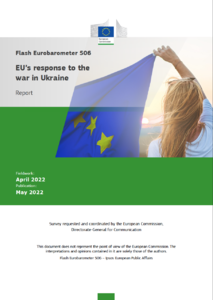
Survey: EU’s response to the war in Ukraine
A Flash Eurobarometer survey was commissioned by the European Commission’s Directorate-General for Communication, with the aim to obtain input from citizens in the European Union (EU) regarding their attitudes on the EU’s response to the war in Ukraine. The survey explores the following topics:
General attitudes to the war in Ukraine, including awareness and concern about the war, as well as sentiments towards Ukraine and Russia;
Opinions on the response of public authorities, including general satisfaction with the response of authorities and citizens, opinions on the EU response in general and specific EU measures, and support for EU measures aimed at securing energy supply and mitigating rising energy prices;
Europeans’ willingness to cut down on their energy consumption via different actions; and
Trust in sources of information about the war in Ukraine, such as European authorities, national authorities, NGOs, journalists and social media.
On behalf of the European Commission, Directorate-General for Communication, Ipsos European Public Affairs interviewed a representative sample of EU citizens, aged 15 and over, in each of the 27 Member States of the EU. Between 13 April and 20 April 2022, 26 066 interviews were conducted via computer-assisted web interviewing (CAWI), using Ipsos online panels and their partner network. Survey data presented in this report are weighted to known population proportions. The EU27 averages are weighted according to the size of the 15+ population of each country.
In particular, more than half of surveyed agree that Ukraine should join the EU when it is ready in all countries except in Hungary (where 47% agree). The largest share of respondents agreeing that Ukraine should join the EU when it is ready is observed in Portugal (87%), followed by Estonia (83%), Lithuania (82%) and Poland (81%). The largest proportions disagreeing that Ukraine should join the EU when it is ready are found in Luxembourg (38%), Greece (37%), Hungary (36%), Austria and Bulgaria (both 35%), and Cyprus and Slovakia (both 34%).

An overwhelming majority of respondents either totally (52%) or tend to agree (26%) that Russian authorities are responsible for the current situation. Bulgaria and Cyprus are the only two countries where a (relative) majority disagree that Russian authorities are responsible for the war (46% and 52%, respectively).

More than two-thirds of respondents are satisfied with how citizens in their country have reacted to the war in Ukraine, including 20% who are very satisfied and 49% who are rather satisfied with the reaction of their fellow citizens (8% don’t know).
Satisfaction with how public authorities have reacted to the war in Ukraine is lower. All in all, about half of respondents are satisfied with how the national authorities in their country, the EU authorities, NATO and the United States have reacted (between 47% and 54%). Satisfaction with how the United Nations reacted is overall the lowest (40%).
Satisfaction with the reaction of the EU to the war ranges from 29% in Greece, 32% in Bulgaria and 33% in Cyprus, to 63% in Romania, 65% in Finland and 67% in Denmark. Satisfaction with the other authorities shows a similar country pattern.
Eight in ten respondents approve economic sanctions against Russia, including 55% who fully approve and 25% who tend to approve. A similar share (79%) approve sanctions against wealthy Russians (oligarchs), with again 55% who fully approve and 24% who approve. Two-thirds approve banning state-owned Russian media from broadcasting in the EU (41% fully approve, 25% tend to approve).
Support for EU economic, military and humanitarian aid to Ukraine is similarly high. An overwhelming majority (93%) approve providing humanitarian support to the people affected by the war, including 64% who fully approve and 29% who tend to approve. Slightly fewer respondents (88%) approve welcoming in the EU people fleeing the war, including 55% who fully approve and 34% who tend to approve. Eight in ten approve financial support for Ukraine, encompassing 42% who fully approve and 38% who tend to approve. About two-thirds of respondents approve financing the purchase and supply of military equipment to Ukraine, including 33% who fully approve and 34% who tend to approve.
Source: European Commission